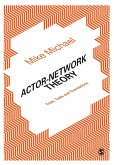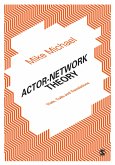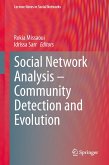We live in a world that is paradoxically both small and vast; each of us is embedded in local communities and yet we are only a few 'links' away from anyone else in the world.
This engaging book represents these interdependencies' positive and negative consequences, their multiple effects and the ways in which a local occurrence in one part of the world can directly affect the rest. Then it demonstrates precisely how these interactions and relationships form.
This is a book for the social network novice learning how to study, think about and analyse social networks; the intermediate user, not yet familiar with some of the newer developments in the field; and the teacher looking for a range of exercises, as well as an up-to-date historical account of the field.
It is divided into three clear sections:
1. historical & Background Concepts
2. Levels of Analysis
3. Advances, Extensions and Conclusions
The book providesa full overview of the field - historical origins, common theoretical perspectives and frameworks; traditional and current analytical procedures and fundamental mathematical equations needed to get a foothold in the field.
This engaging book represents these interdependencies' positive and negative consequences, their multiple effects and the ways in which a local occurrence in one part of the world can directly affect the rest. Then it demonstrates precisely how these interactions and relationships form.
This is a book for the social network novice learning how to study, think about and analyse social networks; the intermediate user, not yet familiar with some of the newer developments in the field; and the teacher looking for a range of exercises, as well as an up-to-date historical account of the field.
It is divided into three clear sections:
1. historical & Background Concepts
2. Levels of Analysis
3. Advances, Extensions and Conclusions
The book providesa full overview of the field - historical origins, common theoretical perspectives and frameworks; traditional and current analytical procedures and fundamental mathematical equations needed to get a foothold in the field.
This book fills an important void in the social network literature by bringing together theory, methodology and history. Its practical and readable style gives clear guidance on how to do social network research and will be invaluable to anyone undertaking a network study
Martin Everett
Chair of Social Network Analysis, Manchester University
Christina Prell has produced an excellent and well-crafted introduction to methods of social network analysis. She has succeeded in the difficult task of setting out a clear and accessible statement of core ideas together with a judicious overview of the most advanced recent developments. Her discussion concludes with an introduction to basic software for network analysis that will be much valued by all who are new to the area. The book will become an essential guide to the field for newcomers and seasoned users alike
John Scott
Professor of Sociology, Plymouth University
Christina Prell's excellent introduction to social network analysis will be appreciated by social scientists coming to these new approaches for the first time. Fundamental methods are described clearly and succinctly, the advice on how to develop a network-based research study is comprehensive and practical, and the introduction to statistical methods will prepare readers keen to follow more advanced paths. It is pleasing to see a text that includes a proper history of the field. This book provides a very accessible guide for readers who want to learn how to do real network research in the social sciences
Garry Robins
Associate Professor and Reader Psychological Science, University of Melbourne
Interest in social networks comes from all quarters and from persons with varying levels of preparation for understanding the complexities of social network analysis. Prell's Social Network Analysis: History, Theory, and Methodology is admirably suited for newcomers to the field, introducing the basics of social network analysis in a gentle style replete with understandable examples. Newcomers (and their instructors) will also appreciate the ease with which they acquire facility with UCINET, a widely used social analysis software package, by working through the examples
John Skvoretz
Professor of Sociology at the University of South Florida
Martin Everett
Chair of Social Network Analysis, Manchester University
Christina Prell has produced an excellent and well-crafted introduction to methods of social network analysis. She has succeeded in the difficult task of setting out a clear and accessible statement of core ideas together with a judicious overview of the most advanced recent developments. Her discussion concludes with an introduction to basic software for network analysis that will be much valued by all who are new to the area. The book will become an essential guide to the field for newcomers and seasoned users alike
John Scott
Professor of Sociology, Plymouth University
Christina Prell's excellent introduction to social network analysis will be appreciated by social scientists coming to these new approaches for the first time. Fundamental methods are described clearly and succinctly, the advice on how to develop a network-based research study is comprehensive and practical, and the introduction to statistical methods will prepare readers keen to follow more advanced paths. It is pleasing to see a text that includes a proper history of the field. This book provides a very accessible guide for readers who want to learn how to do real network research in the social sciences
Garry Robins
Associate Professor and Reader Psychological Science, University of Melbourne
Interest in social networks comes from all quarters and from persons with varying levels of preparation for understanding the complexities of social network analysis. Prell's Social Network Analysis: History, Theory, and Methodology is admirably suited for newcomers to the field, introducing the basics of social network analysis in a gentle style replete with understandable examples. Newcomers (and their instructors) will also appreciate the ease with which they acquire facility with UCINET, a widely used social analysis software package, by working through the examples
John Skvoretz
Professor of Sociology at the University of South Florida
"I would heartily recommend this book to anyone interested in getting acquainted with SNA. Its pragmatic point of view--with recurring hints on how to perform different kinds of analysis using UCINET, a popular software tool for SNA--makes this book especially suitable for practitioners."








